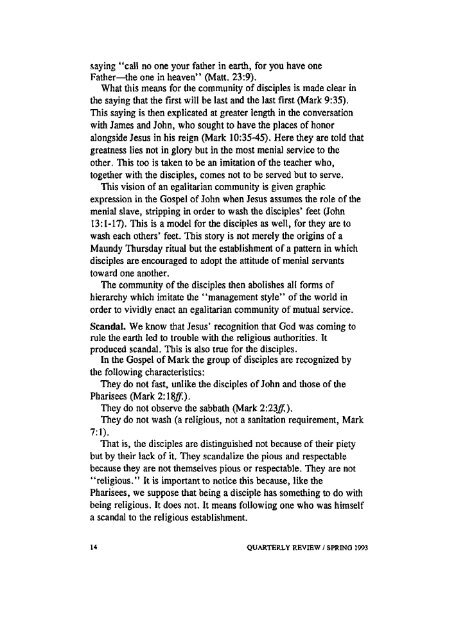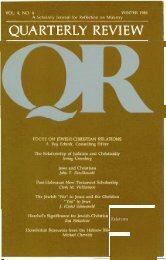TJieodore W. Jennings, Jr. The Meaning of ... - Quarterly Review
TJieodore W. Jennings, Jr. The Meaning of ... - Quarterly Review
TJieodore W. Jennings, Jr. The Meaning of ... - Quarterly Review
Create successful ePaper yourself
Turn your PDF publications into a flip-book with our unique Google optimized e-Paper software.
saying "call no one your father in earth, for you have one<br />
Father—the one in heaven" (Matt. 23:9).<br />
What this means for the community <strong>of</strong> disciples is made clear in<br />
the saying that the first will be last and the last first (Mark 9:35).<br />
This saying is then explicated at greater length in the conversation<br />
with James and John, who sought to have the places <strong>of</strong> honor<br />
alongside Jesus in his reign (Mark 10:35-45). Here they are told that<br />
greatness lies not in glory but in the most menial service to the<br />
other. This too is taken to be an imitation <strong>of</strong> the teacher who,<br />
together with the disciples, comes not to be served but to serve.<br />
This vision <strong>of</strong> an egalitarian community is given graphic<br />
expression in the Gospel <strong>of</strong> John when Jesus assumes the role <strong>of</strong> the<br />
menial slave, stripping in order to wash the disciples' feet (John<br />
13:1-17). This is a model for the disciples as well, for they are to<br />
wash each others' feet. This story is not merely the origins <strong>of</strong> a<br />
Maundy Thursday ritual but the establishment <strong>of</strong> a pattern in which<br />
disciples are encouraged to adopt the attitude <strong>of</strong> menial servants<br />
toward one another.<br />
<strong>The</strong> community <strong>of</strong> the disciples then abolishes all forms <strong>of</strong><br />
hierarchy which imitate the "management style" <strong>of</strong> the world in<br />
order to vividly enact an egalitarian community <strong>of</strong> mutual service.<br />
Scandal. We know that Jesus' recognition that God was coming to<br />
rule the earth led to trouble with the religious authorities. It<br />
produced scandal. This is also true for the disciples.<br />
In the Gospel <strong>of</strong> Mark the group <strong>of</strong> disciples are recognized by<br />
the following characteristics:<br />
<strong>The</strong>y do not fast, unlike the disciples <strong>of</strong> John and those <strong>of</strong> the<br />
Pharisees (Mark 2:18#).<br />
<strong>The</strong>y do not observe the sabbath (Mark 2:23$).<br />
<strong>The</strong>y do not wash (a religious, not a sanitation requirement, Mark<br />
7:1).<br />
That is, the disciples are distinguished not because <strong>of</strong> their piety<br />
but by their lack <strong>of</strong> it. <strong>The</strong>y scandalize the pious and respectable<br />
because they are not themselves pious or respectable. <strong>The</strong>y are not<br />
"religious." It is important to notice this because, like the<br />
Pharisees, we suppose that being a disciple has something to do with<br />
being religious. It does not. It means following one who was himself<br />
a scandal to the religious establishment.<br />
14 QUARTERLY REVIEW / SPRING 1993












